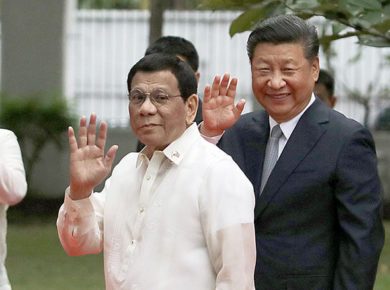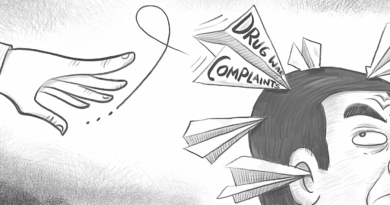COLUMN: OPINION ON PAGE ONE- Exploiting Xi’s visit – By Francisco S. Tatad

CHINESE President Xi Jinping’s current state visit is easily the most important state visit of any foreign head of state to the Philippines since China began its rise as a global economic power. Its real significance has to be viewed not only within the context of the two countries’ bilateral ties, but above all within the context of China’s and the United States’ competing push to become the Philippines’ primary political, economic and security Southeast Asian ally. President Rodrigo Duterte has often lacked the diplomatic polish to handle this matter with sophistication, but he has clearly decided that in the race for dominance in the region, China is the right horse to bet on; its rise is unstoppable for now. The burden on the part of his critics is to prove that such judgment is wrong.
.
ADS by Cloud 9:
.
– SPACE RESERVE FOR YOUR ADVERTISEMENT –
.
.
A historic relationship
China and the Philippines have a centuries-old relationship, which antedates the 1898 Treaty of Paris that allowed the US to take over the Philippine islands from Spain at the cost of $20 million. So many Filipinos have ethnic Chinese roots: the most strategic sectors of the nation’s economy are now almost entirely under their control; all but one or two of the world’s richest Filipinos, as listed yearly in Forbes magazine, have Chinese surnames; so are the other Filipino dollar billionaires, who have yet to legalize their holdings. Where wealthy Chinese Filipinos previously bankrolled the careers of Filipino politicians, a new generation of Chinese Filipinos have since become national political players themselves.
Despite all this, serious territorial and maritime disputes divide the two countries. Both claim to be committed to finding solutions under international law that would enhance rather than diminish their good neighborly relations. But Beijing summarily rejected the Philippines’initial effort to let the Permanent Court of Arbitration at the Hague arbitrate the overlapping Philippine and Chinese maritime claims in the Spratlys. And when, despite such rejection, the court assumed jurisdiction and dismissed China’s claim under its so-called “nine-dash line,” by ruling in favor of the Philippines, DU30 brusquely set aside the ruling, in exchange for the promise of Chinese economic aid and investments.
.
ADS by Cloud 9:
.
– SPACE RESERVE FOR YOUR ADVERTISEMENT –
.
.
DU30’s gambit
Only DU30’s stranglehold on Congress, which now functions as DU30’s rubber stamp, prevented his being impeached for culpable violation of the Constitution, treason, betrayal of public trust and other high crimes. But China used DU30’s decision to accelerate its reclamation and fortification of the disputed islands, islets, shoals and other marine formations, and to deploy surface-to-air and anti-ship missiles to some of them. China has militarized the area to become the equivalent of one of America’s aircraft carriers.
DU30 assured his countrymen that this did not threaten the security of the Philippines. It certainly created tension with other Spratlys claimants like Vietnam and Taiwan, among others, and certainly with the US whose 7th Fleet provides naval security for the entire Western Pacific, and particularly this vital waterway, through which $5 trillion worth of world trade passes every year. But DU30 said no one can do anything more about it.
China is now in possession and control of the disputed areas, said DU30, and any attempt to dislodge China from its present position could only provoke armed hostilities, if not war. Neither the US nor China nor anybody else wants war. However, the US Navy, joined lately by Australia and occasionally by Japan, continues to carry out “freedom of navigation” exercises in the South China Sea. At the just-concluded Asean summit in Singapore, US Vice President Mike Pence said no single country owns the South China Sea, and that the US Navy will continue to sail wherever international law allows them to. This is not without risk.
.
ADS by Cloud 9:
.
– SPACE RESERVE FOR YOUR ADVERTISEMENT –
.
.
Echoing Beijing
In his own statement, DU30 called on nations to refrain from “adventurism” and avoid complicating further an already complicated situation in the South China Sea. Analysts saw this as an undisguised echo of Beijing’s statement in reference to the US continuing naval activities near the disputed areas. This did not occupy as much media space as DU30’s celebrated “power naps” at the summit, but this was perhaps his most significant statement with respect to the US-China competition for preeminence in this part of the world.
It also served as a prelude to DU30’s formal welcome for Xi, who arrived yesterday, on his two-day state visit.
On his first state visit to China in October 2016, DU30 declared he was separating his government militarily and economically from the US and aligning it with China and Russia “against the world.” He extended an open palm to his Chinese hosts and said, unabashedly, that “I need China more than anybody else at this time of our national life. I need China.” He came home with $24 billion in promised grants and investments, whose delivery has not been as prompt and significant as expected.
DU30 has not withdrawn or modified that phenomenal statement. In fact, he has enlarged it to say that Xi Jinping will not allow him to be ousted from power by any hostile force. No Chinese official has confirmed DU30’s claim; perhaps, while here, Xi may want to confirm or deny it. DU30 has claimed that the communists want him ousted, and that the CIA wants him killed. So far this appears to be all talk.
Even as Chinese military transport planes and missiles were seen on the disputed areas, DU30 opened the country to Chinese planes and ships landing or docking in Davao. The speculation ranged from these ships and planes carrying surveillance equipment for the President, to their transporting medical equipment and personnel, also for the President.
.
ADS by Cloud 9:
.
– SPACE RESERVE FOR YOUR ADVERTISEMENT –
.
.
Chinese province
None of this was ever confirmed though. In February, DU30 joked crudely that China should probably just declare the Philippines a “province of China.” Months later, some militants put up banners in footbridges near Malacañang saying, “Welcome to the Philippines, province of China.” This elicited a strong reaction not only from Malacañang but also from the Chinese embassy in Manila. It is to be hoped that no such signs have been hung anywhere during Xi’s visit.
Should war erupt in the South China Sea either from sheer miscalculation or by some tragic accident, the first victim would be the Philippines, and Filipinos would be the first ones to die. The Philippines has a mutual defense treaty with the US, and none with China, so the Philippines would be obliged under this treaty to stand shoulder to shoulder with the US. Xi and DU30 cannot seek to undo this. They should therefore work together with this alliance, rather than against it.
The future of humanity can be guaranteed only when all the powers have agreed to work together to bring about an inclusive world, where a security partnership like that of the Philippines and the US could be made one of the foundation stones, to which partnership with China should be added. DU30 has the opportunity to play the role of a world statesman by trying to convince Xi and his American counterpart to make China and the US partners for peace and progress RATHER THAN PARTIES IN CONFLICT.
.
ADS by Cloud 9:
.
– SPACE RESERVE FOR YOUR ADVERTISEMENT –
.
.
 All photographs, news, editorials, opinions, information, data, others have been taken from the Internet ..aseanews.net | [email protected] |.For comments, Email to :D’Equalizer | [email protected] | Contributor
All photographs, news, editorials, opinions, information, data, others have been taken from the Internet ..aseanews.net | [email protected] |.For comments, Email to :D’Equalizer | [email protected] | Contributor









